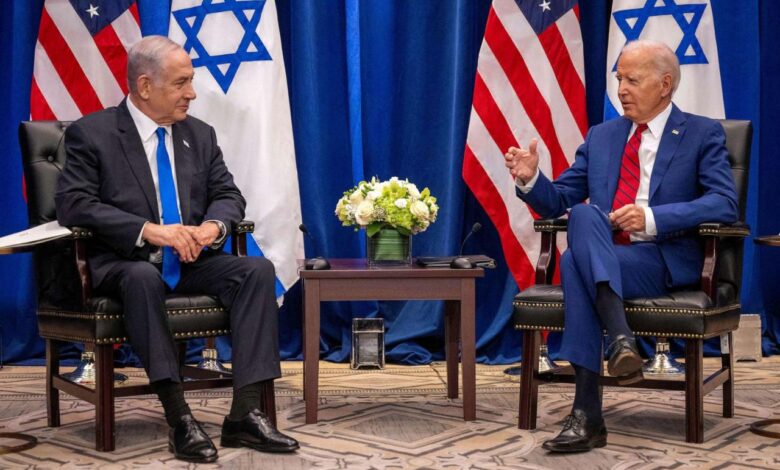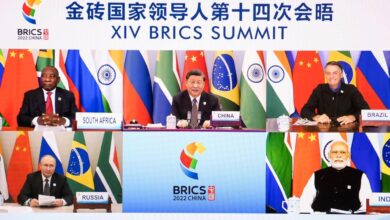
Harris to Meet Bibi High-Stakes Meeting
Harris to Meet Bibi: The upcoming meeting between Vice President Kamala Harris and Israeli Prime Minister Benjamin Netanyahu is shaping up to be a pivotal moment in US-Israel relations. Geopolitical tensions are running high, with the ongoing conflict in Palestine and broader regional instability adding significant weight to the discussions. What will be on the agenda? What are the potential outcomes?
Let’s delve into this crucial encounter and explore the potential implications for both countries and the wider Middle East.
This meeting comes at a particularly sensitive time, given recent events in the region and the domestic political climates in both the US and Israel. We’ll examine the key issues likely to be discussed, including security concerns, economic cooperation, and the ongoing Palestinian-Israeli conflict. We’ll also analyze the potential outcomes and how this meeting could reshape the future of US foreign policy in the Middle East.
The Meeting Context
The meeting between Vice President Kamala Harris and Israeli Prime Minister Benjamin Netanyahu occurs against a backdrop of significant geopolitical shifts in the Middle East and increasing global tensions. The context is complex, shaped by ongoing conflicts, regional alliances, and evolving domestic priorities within both the US and Israel. Understanding this context is crucial to interpreting the meeting’s significance and potential outcomes.The key issues likely to dominate the discussions are multifaceted and interconnected.
They range from Iran’s nuclear program and its destabilizing influence in the region to the ongoing Israeli-Palestinian conflict and the security situation in the West Bank and Gaza. Economic cooperation, particularly regarding technological advancements and energy security, will also be a prominent theme. Furthermore, the broader implications of the war in Ukraine and its impact on global stability are likely to feature in the conversations.
Finally, differences in approaches to the Palestinian issue and the ongoing judicial overhaul debate within Israel will inevitably influence the tone and substance of the dialogue.
Potential Impact on US-Israel Relations
The meeting’s impact on US-Israel relations hinges on several factors. A successful meeting, characterized by open communication and a shared understanding of key challenges, could strengthen the strategic partnership between the two nations. This could manifest in increased military cooperation, enhanced intelligence sharing, and more aligned foreign policy positions on regional issues. Conversely, a strained or unproductive meeting could exacerbate existing tensions, particularly regarding the Israeli government’s policies on the Palestinian issue and its domestic political reforms.
So, Harris is meeting Bibi – big news, right? It got me thinking about unexpected partnerships, and I remembered reading this fascinating article about how bush pigs saved Madagascar’s baobabs ; who knew those little guys were such conservation heroes? It’s a reminder that sometimes the most unlikely alliances yield the best results, much like the potential outcomes of this Harris-Bibi meeting.
Historical precedent suggests that disagreements, particularly on human rights and the peace process, can impact the overall trajectory of the relationship, potentially leading to periods of strained relations. However, the strong historical ties and strategic interests shared by both countries generally ensure that even periods of disagreement are eventually overcome through diplomacy and negotiation.
So, Harris is meeting with Bibi – big geopolitical stuff, right? But it got me thinking about how even high-stakes diplomacy intersects with everyday life. I was reading this fascinating article on the economics of thinness ozempic edition , and it made me realize how much seemingly trivial things like weight loss trends can reflect broader societal pressures.
It’s all connected, really, and the Harris-Bibi meeting is just one piece of a much larger puzzle.
Historical Overview of Previous Meetings Between Harris and Netanyahu
While specific details of all past meetings might not be publicly available due to the nature of high-level diplomatic engagements, it’s known that Vice President Harris and Prime Minister Netanyahu have interacted on multiple occasions, both formally and informally, since Harris assumed office. These encounters likely involved discussions mirroring the themes expected in this latest meeting: regional security, the Israeli-Palestinian conflict, and economic cooperation.
Previous interactions provide a framework for understanding their working relationship and potential areas of agreement or disagreement. The tone and outcomes of those past meetings will undoubtedly influence the dynamics of their current interaction, setting a precedent for the level of cooperation and understanding achievable in this latest encounter. The degree of alignment or divergence in their stated positions on critical issues during these past meetings will serve as a useful benchmark against which to assess the progress and achievements of the current meeting.
Harris’s Objectives
Vice President Kamala Harris’s visit to Israel, alongside her meetings with Prime Minister Benjamin Netanyahu, served several key objectives for the United States. The trip aimed to reaffirm the strong US-Israel strategic partnership while addressing critical regional issues and advancing specific policy goals. This visit, while seemingly focused on bilateral relations, also played a significant role in broader US foreign policy initiatives in the Middle East.The primary goals of Harris’s visit encompassed strengthening security cooperation, fostering economic ties, and promoting diplomatic solutions to regional conflicts.
The US seeks to leverage its strong relationship with Israel to maintain stability in a volatile region and counter threats from Iran and other adversarial actors. Economically, the US aims to expand trade and investment opportunities between the two countries, furthering technological innovation and shared economic growth. Diplomatically, the US hoped to utilize this high-level engagement to advance its vision for a two-state solution and encourage de-escalation in the Israeli-Palestinian conflict.
Strategic Interests of the US
The US has long-standing strategic interests in Israel, viewing it as a crucial ally in a strategically important region. These interests extend beyond simply maintaining a friendly relationship; they are deeply intertwined with US national security and foreign policy objectives. Maintaining Israel’s security is seen as vital for regional stability, preventing the spread of extremism, and countering Iranian influence.
Furthermore, Israel’s technological advancements and economic strength are seen as valuable assets in fostering broader regional cooperation and economic development. The US also uses its relationship with Israel as a platform to engage with other regional players, often mediating disputes and promoting dialogue.
Potential Policy Announcements
While specific policy announcements from the Harris-Netanyahu meeting were not always immediately publicized, several potential outcomes were anticipated. These included strengthened security cooperation agreements, possibly involving increased intelligence sharing or joint military exercises. Further commitments to economic partnerships, perhaps involving joint ventures in technology or infrastructure projects, were also likely. Finally, the meeting could have yielded renewed diplomatic efforts regarding the Israeli-Palestinian conflict, potentially involving initiatives for peace talks or humanitarian aid.
For example, a previous high-level visit might have resulted in a joint statement outlining a commitment to addressing specific humanitarian needs in the West Bank or Gaza.
Comparison to Other Recent High-Level Engagements
Harris’s visit to Israel can be compared to other recent high-level US-Israel engagements, such as visits by Secretary of State Antony Blinken and other senior administration officials. While each visit focuses on specific aspects of the bilateral relationship, a common thread is the consistent emphasis on security cooperation and strategic alignment. However, the Vice President’s visit carries a unique weight, representing a high-level commitment from the US administration and signaling the importance placed on the relationship.
The difference lies in the level of political representation and the broader implications of the visit. While other officials may focus on specific policy areas, the Vice President’s visit often serves to reaffirm the overall strategic partnership and set the tone for future collaborations.
Netanyahu’s Perspective
Netanyahu’s meeting with Vice President Harris occurs at a pivotal moment in Israeli politics and amidst significant regional instability. Understanding his perspective requires considering his long-term political goals, the immediate domestic pressures he faces, and his desired outcomes from this high-profile encounter. His approach will be shaped by a complex interplay of these factors.Netanyahu’s primary political priorities leading up to the meeting center on consolidating his power and maintaining a strong right-wing coalition government.
He’s also keenly focused on securing Israel’s national security interests, particularly concerning Iran’s nuclear ambitions and regional threats. Domestically, he is navigating a challenging political landscape, facing ongoing protests and criticism over his judicial overhaul plans.
Domestic Political Pressures
The judicial overhaul proposals, which aim to significantly alter the balance of power between the judiciary and the government, have triggered massive and sustained public protests. These protests represent a significant challenge to Netanyahu’s authority and threaten to further polarize Israeli society. He needs to demonstrate both strength and stability to his domestic base while simultaneously projecting an image of responsible leadership to the international community.
This balancing act will heavily influence his approach to the meeting with Harris. A perceived concession on the judicial reforms could weaken his standing within his coalition, while a hardline stance could further alienate international partners.
Netanyahu’s Objectives and Desired Outcomes
Netanyahu’s likely objectives include reinforcing the strategic alliance between the United States and Israel, securing continued American military and economic support, and presenting a united front against common threats, primarily Iran. He will likely seek to emphasize the shared interests between the two countries and downplay areas of disagreement, particularly regarding the judicial overhaul and the Israeli-Palestinian conflict. A successful outcome for Netanyahu would involve a reaffirmation of strong US-Israel ties, with minimal public criticism of his domestic policies from the US administration.
He may also aim to secure assurances of continued US support for Israel’s security needs, especially regarding Iranian aggression.
Potential Points of Contention
Several potential points of contention could emerge during the meeting. The most significant is likely to be the Israeli government’s judicial overhaul. The Biden administration has expressed concerns about the potential impact of these reforms on Israel’s democratic institutions and its commitment to the rule of law. Differences in approach to the Israeli-Palestinian conflict could also surface, with the US likely advocating for a two-state solution and engagement with the Palestinian Authority, while Netanyahu’s government may prioritize security concerns and maintain a more cautious approach to negotiations.
Finally, differing perspectives on Iran’s nuclear program and the best way to address it could also lead to disagreements, particularly concerning the use of military force. The handling of these sensitive issues will be crucial in determining the overall success of the meeting from both perspectives.
So, Harris is meeting with Bibi – a significant geopolitical moment, no doubt. But it got me thinking about the information landscape surrounding such events. This whole thing made me remember reading about the manipulation of narratives, like the revelations in this shocking report: j6deleted internet sting operation exposes in real time how twitter manipulated jan 6 narrative.
It really makes you question how much we actually know about any major political event, and how that impacts our understanding of meetings like the one between Harris and Bibi.
Regional Implications: Harris To Meet Bibi
The meeting between Vice President Harris and Prime Minister Netanyahu carries significant weight beyond the bilateral relationship. Its impact reverberates across the volatile Middle East, influencing existing power dynamics and potentially reshaping future alliances. The discussions held will undoubtedly have far-reaching consequences for regional stability and the ongoing Israeli-Palestinian conflict.
Impact on Relations with Palestine
The Palestinian Authority’s reaction to the Harris-Netanyahu meeting will be crucial in gauging its immediate impact on the peace process. A perceived lack of US engagement with Palestinian concerns could further erode trust and fuel existing tensions. Conversely, if the meeting demonstrates a commitment to a two-state solution and acknowledges Palestinian grievances, it could foster a more constructive dialogue.
However, given the current political climate and the differing perspectives on the conflict, a significant shift in the status quo seems unlikely in the short term. Past instances of high-level US-Israeli meetings have often led to heightened Palestinian frustration, particularly if the discussions focus primarily on security concerns without addressing the underlying issues of occupation and statehood.
Implications for Regional Stability in the Middle East
The meeting’s implications for regional stability are complex and multifaceted. Strengthened US-Israel ties might be perceived as a challenge by some regional actors, potentially leading to increased tensions. For example, Iran, a key rival of Israel, is likely to view the meeting with suspicion, potentially escalating existing proxy conflicts. Conversely, countries with strong ties to the US might see the meeting as a reinforcement of the existing regional order, promoting stability through a strong US presence.
The level of regional stability will hinge significantly on the messaging emanating from the meeting – a focus on counter-terrorism and regional cooperation could foster a more stable environment, while a perceived tilt towards Israel could exacerbate existing tensions. The Abraham Accords, while showcasing a degree of regional cooperation, remain fragile and could be impacted by the perceived balance of US engagement.
Reactions from Other Regional Powers
Reactions from other regional powers will vary widely depending on their existing relationships with both the US and Israel. Countries like Egypt and Jordan, which have peace treaties with Israel, might welcome the meeting as a sign of continued US support for regional stability. However, countries with strong anti-Israel sentiments, such as Lebanon or Syria, will likely condemn the meeting, potentially using it to rally domestic support and mobilize regional opposition.
The Gulf states, some of which have normalized relations with Israel under the Abraham Accords, will likely adopt a more nuanced approach, balancing their desire for closer ties with Israel with the need to maintain relationships with other regional actors. Saudi Arabia, for instance, might seek assurances that US support for Israel doesn’t come at the expense of its own regional ambitions.
Comparison of Responses from Different Countries in the Region
A spectrum of responses is expected. States with established relationships with Israel, such as those involved in the Abraham Accords, might express cautious optimism, emphasizing shared security interests and economic cooperation. In contrast, countries actively opposed to Israel’s policies will likely voice strong criticism, highlighting concerns about the Palestinian issue and potential implications for regional security. The level of condemnation or support will depend on the specific country’s foreign policy priorities, its relationship with the US, and the perceived outcome of the Harris-Netanyahu meeting.
For instance, while the UAE and Bahrain might express support for the meeting, given their existing normalization agreements with Israel, countries like Iran and Hezbollah will likely condemn the meeting as a sign of US bias and support for Israeli aggression.
Visual Representation of Key Issues

The meeting between Vice President Harris and Prime Minister Netanyahu involved a complex interplay of issues. Understanding these requires visualizing both the specific points of contention and the broader network of relationships influencing the discussion. The following table and visual representation aim to clarify this complexity.
Key Issues Table
This table summarizes the key issues, contrasting the US and Israeli positions, and offering a potential outcome for each.
| Issue | US Position | Israeli Position | Potential Outcome |
|---|---|---|---|
| Palestinian Statehood | Support for a two-state solution, with caveats regarding security concerns. | Skeptical of a viable two-state solution, prioritizing security and maintaining control over key areas. | Continued stalemate, with potential for incremental progress on specific confidence-building measures. |
| Iranian Nuclear Program | Maintaining the JCPOA (or a similar agreement) as the best path to prevent Iran from acquiring nuclear weapons. | Strong opposition to the JCPOA, viewing Iran as an existential threat and advocating for stronger military and diplomatic pressure. | Continued disagreements, with potential for collaboration on specific intelligence sharing and counter-proliferation efforts. |
| Settlements | Concerns about settlement expansion hindering peace prospects, calling for a freeze or limitations. | Defense of settlement expansion as a legitimate expression of Jewish history and national security. | Continued tension, with potential for diplomatic maneuvering and compromises on the pace of settlement growth. |
| Human Rights | Concerns regarding human rights issues in the West Bank and Gaza, calling for accountability and respect for international law. | Emphasis on security concerns and the need to counter terrorism, with arguments that actions are taken in self-defense. | Continued dialogue and possible incremental improvements in certain areas, but unlikely to lead to significant breakthroughs in the short term. |
Visual Representation of Key Players and Relationships
The key players and their relationships can be effectively represented using a network graph. Imagine a central node representing the US, connected to other nodes representing Israel, Palestine, Iran, and other key regional actors (e.g., Saudi Arabia, Egypt). The thickness of the lines connecting these nodes would represent the strength of the relationship, with thicker lines indicating stronger ties (positive or negative).
For instance, a thick line between the US and Israel would illustrate the strong bilateral relationship. A thinner, potentially dashed line between Israel and Palestine would reflect the strained relationship. Arrows on the lines could indicate the direction of influence or pressure. For example, an arrow from the US to Israel might represent US pressure on Israel regarding settlements.
Iran would likely have thinner, negatively charged connections with both the US and Israel, reflecting the significant tensions. The graph would dynamically show the interplay of relationships and the influence each player exerts on others. This visual allows for a quick understanding of the complex web of alliances, tensions, and pressures at play during the meeting.
Potential Outcomes and Follow-up Actions

The meeting between Vice President Harris and Prime Minister Netanyahu holds significant potential for shaping the US-Israel relationship and the broader Middle East landscape. The outcomes, however, are contingent on a complex interplay of domestic and international factors, making precise predictions challenging. The success of the meeting will be measured not only by immediate agreements but also by its long-term impact on regional stability and cooperation.The potential for concrete agreements is substantial, ranging from security cooperation to economic partnerships.
However, the level of detail and the specific commitments made will depend greatly on the willingness of both sides to compromise and find common ground on contentious issues. Short-term consequences might include increased joint military exercises or renewed diplomatic efforts on specific regional conflicts. Long-term impacts could involve a strengthening of the strategic alliance, increased trade and investment, or even a shift in regional power dynamics.
Potential Agreements and Joint Statements
A successful meeting could result in a joint statement reaffirming the strong US-Israel strategic partnership. This statement might include commitments to enhance security cooperation, particularly regarding Iran’s nuclear program and regional threats. Further, there could be agreements on increased economic collaboration, perhaps focusing on technology transfer, investment in Israeli innovation, or joint ventures in energy or water management.
The specifics would depend heavily on the pre-meeting negotiations and the willingness of both parties to address sensitive issues. For example, a joint statement might address the need for de-escalation in the West Bank, while stopping short of endorsing specific policy changes. A successful agreement would need to balance immediate goals with the long-term interests of both nations.
Previous examples of successful joint statements between the US and Israel have often focused on common security concerns and economic collaborations.
Short-Term and Long-Term Consequences, Harris to meet bibi
Short-term consequences could involve increased intelligence sharing and joint military exercises. We might also see a renewed diplomatic push towards resolving regional conflicts, possibly involving increased US mediation efforts. In the long term, a successful meeting could strengthen the US-Israel strategic partnership, leading to increased economic ties and technological cooperation. Conversely, a failed meeting could strain the relationship, leading to reduced cooperation and potential for increased regional instability.
The impact will be felt across multiple sectors, including defense, economy, and regional diplomacy. The example of the Abraham Accords, while not directly a result of a single US-Israel meeting, illustrates the potential for significant long-term regional changes stemming from strong bilateral cooperation.
Potential Next Steps Following the Meeting
Following the meeting, both sides will likely initiate follow-up actions to implement any agreements reached. This could include the establishment of joint working groups to oversee specific projects, increased high-level diplomatic exchanges, or the scheduling of further meetings between relevant officials. Depending on the outcomes, there might be increased efforts to engage other regional players to foster wider cooperation or de-escalate tensions.
The specific next steps will depend on the agreements reached and the priorities of both governments. The establishment of a joint task force focused on technological innovation, for instance, would require a significant level of follow-up action.
Impact on Future US Foreign Policy in the Region
This meeting could significantly shape future US foreign policy in the Middle East. A successful outcome could reinforce the US commitment to Israel’s security and its role as a key strategic partner. This could lead to increased US engagement in regional security initiatives and a more assertive approach towards Iran. Conversely, a less successful meeting could lead to a reassessment of US strategy, potentially involving a less interventionist approach or a greater focus on other regional priorities.
The meeting’s outcome will serve as a benchmark for future US interactions with other regional actors, influencing the overall trajectory of US foreign policy in the Middle East for years to come. The success or failure of this meeting could influence the US’s approach to other regional challenges, such as the Israeli-Palestinian conflict and the broader dynamics in the region.
The meeting between Harris and Netanyahu holds immense significance for the future of US-Israel relations and regional stability. While predicting the exact outcome is impossible, the potential for both cooperation and conflict is undeniable. The discussions will undoubtedly touch upon complex and sensitive issues, demanding careful diplomacy and a nuanced understanding of the geopolitical landscape. The coming days and weeks will be crucial in assessing the long-term consequences of this high-stakes encounter, and its ripple effects throughout the region.
This meeting is more than just a diplomatic exchange; it’s a critical juncture that will shape the course of events for years to come.





